 MyDogBreeds
MyDogBreeds Shikoku is originated from Japan but Polish Tatra Sheepdog is originated from Poland. Shikoku may grow 43 cm / 16 inches shorter than Polish Tatra Sheepdog. Shikoku may weigh 7 kg / 15 pounds lesser than Polish Tatra Sheepdog. Shikoku may live 3 years more than Polish Tatra Sheepdog. Both Shikoku and Polish Tatra Sheepdog has almost same litter size. Both Shikoku and Polish Tatra Sheepdog requires Moderate maintenance.
Shikoku is originated from Japan but Polish Tatra Sheepdog is originated from Poland. Shikoku may grow 43 cm / 16 inches shorter than Polish Tatra Sheepdog. Shikoku may weigh 7 kg / 15 pounds lesser than Polish Tatra Sheepdog. Shikoku may live 3 years more than Polish Tatra Sheepdog. Both Shikoku and Polish Tatra Sheepdog has almost same litter size. Both Shikoku and Polish Tatra Sheepdog requires Moderate maintenance.
 The Shikoku is from the Shikoku Island in Japan and they are very much like the Japanese Shiba Inu. There are six native Japanese dog breeds and the Shikoku is medium sized and sits in between the smaller Shiba Inu and the very large Akita Inu. All of the Japanese native breeds are members of the Spitz family. The Japanese have sorted their six breeds into 3 categories by size. Being medium size, the Shikoku is a member of the Shika-inus group. Others in this group are the Ainu Ken, the Kai Ken and the Kishu Inu. There are small differences between the three dogs in the Shika-inus group.
The Shikoku is from the Shikoku Island in Japan and they are very much like the Japanese Shiba Inu. There are six native Japanese dog breeds and the Shikoku is medium sized and sits in between the smaller Shiba Inu and the very large Akita Inu. All of the Japanese native breeds are members of the Spitz family. The Japanese have sorted their six breeds into 3 categories by size. Being medium size, the Shikoku is a member of the Shika-inus group. Others in this group are the Ainu Ken, the Kai Ken and the Kishu Inu. There are small differences between the three dogs in the Shika-inus group.
The Shikoku was bred to be a hunting dog in Kochi Prefecture to hunt boar and deer. Other names for the breed include Kochi-ken and Kishu dog or boar hound. This dog is considered to be the purest of the Japanese native dogs or Nihoken. They are today very , very rare. There are very few outsides of Japan, but some in North America are attempting to save the breed.
The are od Kochi Prefecture is a mountainous region with rough terrain that anyone outside of the area would have a hard time accessing. That is why the Shikoku is considered to be so pure as they were pretty well isolated in the mountains. The breeders were also isolated by the mountains and there was very little interbreeding. Although breeding the same dog, these different groups developed different lines of the Shikoku.
Documentation tells us that the number of originals lines was just two and these were the Western and Eastern Shikoku. The Western dog was known as the Mount Ishizuchi Shikoku and the Eastern as the Mount Tsurugi Shikoku. Within these two lines of Shikoku there are additional strains.
Within the Eastern line there is the Tokushima (lya) and the Koci-Aki strains. Within the Western line there is the Hata Uwahara, the Ehime-ken Shuso-gun and the Honkawa. Among these lines and strains, there are different coats and different colors; some heavier and some taller, but all figure into the development of the breed.
Finally, in the Showa Era the Japanese established the Dog Protective League and they began collecting the native dogs from around the country. They protected them so that the breed will go on. The Shikoku is today recognized as Foundation Stock by the AKC and it is fully recognized by the Japan Kennel Club, the Canadian Hound Club and the Shikoku has been declared a living Japanese “natural monument”.
Two bloodlines became the way the Shikoku were know after the war – the Honkawa and the Hata lines The Honkawa line were the descendants of the Choshun-go and the Hata line were the descendants of the Matsukaze-go. They bred the lines separately until 1955, when they mixed them to make the breed stronger. They are no longer considered separate in any way.
Because they are such primitive dogs, the Shikoku are good watch dogs and quite reserved with strangers. They need a lot of socialization to be a family pet but once they are, they make great companions. Intelligent, quick to learn and eager to please. Of the two lines of Shikoku dogs from the Western strains, the current Shikoku owes much of its current development to the Honkawa and Hata strains.
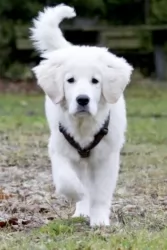 Known also as the Tatra Mountain Sheepdog, Polish Mountain Sheepdog or the Polski Owczarek, the Polish Tatra Sheepdog comes from Poland.
Known also as the Tatra Mountain Sheepdog, Polish Mountain Sheepdog or the Polski Owczarek, the Polish Tatra Sheepdog comes from Poland.
Shepherds were wanting an excellent guard dog for their livestock, and this dog has a natural instinct for guarding. Apart from being a good protection dog, the dog is also a superb companion.
This is a rare dog breed and not recognized by the AKC. This is actually an ancient breed, and the dog has lived in the Polish mountains for thousands of years. When the breed actually came about hasn’t been recorded. Some people suggest the Tatra Sheepdog comes from the Mastiff dog.
After the World Wars the dog’s number had been reduced and the Federation Cynologique Internationale started breeding the dog in the 1960s.
 Today’s Shikoku is a medium sized breed with a Spitz like body – square with a head that is wedge shaped. The ears are pointed, and the tail is curved and feathered. They have arched toes and hard pads with dark, hard nails.
Today’s Shikoku is a medium sized breed with a Spitz like body – square with a head that is wedge shaped. The ears are pointed, and the tail is curved and feathered. They have arched toes and hard pads with dark, hard nails.
The two lines of the Shikoku are slightly different in built and look. The Honkawa strain is slender and athletic; agile and single coated. They have dark eyes and most of them are black and tan.
On the other hand, the Hata strain is much heavier boned, with the front more muscular than the rear. They have small ears, a wide skull and a strong undercoat. His eyes are shaped differently than the Honkawa. Their coats are also mostly red and tan.
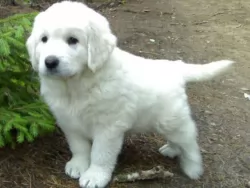 If you bring a Polish Tatra Sheepdog puppy into your home you might think you had a gorgeous Polar Pear Cub roaming around – that’s how cute they are.
If you bring a Polish Tatra Sheepdog puppy into your home you might think you had a gorgeous Polar Pear Cub roaming around – that’s how cute they are.
These are large, well built white coated dogs and the average height for them as an adult is between 60 to 70cm, male and female. Weight of the dog is between 36 and 60kg.
The double coat is medium length and thick. The ears are medium length and floppy and the tail is long and carried low when the dog is at rest, but it is carried up and over the back when the dog is alert and watchful.
These dogs have a lot of characteristics that make it such a good guardian dog. He is territorial, bold, protective, loyal and always loving towards his human family.
The Tatra has a loud bark and he uses this when he is wary of anything that he thinks may harm his family. He is an intelligent dog too, and you won’t have any trouble training and socializing him.
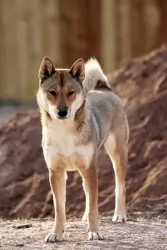 1.Children friendliness – They might be a little aloof with children. They are hunters.
1.Children friendliness – They might be a little aloof with children. They are hunters.
3.Adaptability with your commitment to exercise they can live anywhere even in an apartment.
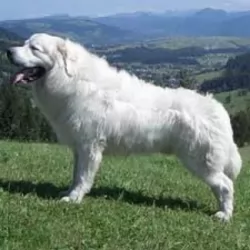 These large sheepdogs have always been guard dogs – they were bred to guard sheep and have always spent a lot of time on their own, away from humans.
These large sheepdogs have always been guard dogs – they were bred to guard sheep and have always spent a lot of time on their own, away from humans.
To many people, he may seem to be somewhat aloof and independent, but for people looking for a guard dog, this particular characteristic is particularly appealing.
Nonetheless, brought up with lots of love and care he makes the most devoted, loving pet.
 Being isolated as they were, the Shikoku was a fairly healthy breed, no genetic testing has been done. Despite this they suffer a few of the same potential issues as other breeds their size.
Being isolated as they were, the Shikoku was a fairly healthy breed, no genetic testing has been done. Despite this they suffer a few of the same potential issues as other breeds their size.
Otherwise this is an agile and hardy breed with no known congenital health issues.
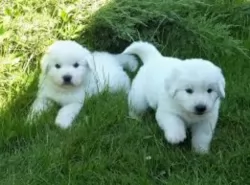 While your Polish Tatra Sheepdog isn’t likely to suffer from any major dog health issues if he is well fed, well exercised and loved, he may well succumb to one or two of some of the typical illnesses there are that plague dogs -
While your Polish Tatra Sheepdog isn’t likely to suffer from any major dog health issues if he is well fed, well exercised and loved, he may well succumb to one or two of some of the typical illnesses there are that plague dogs -
This is such a common- and serious problem with dogs, that it bears mentioning. Hip dysplasia is a problem with the hips so that the bones don’t fit- and move properly. The end result for the dog is pain, inflammation and swelling. Your dog is reluctant to play and get up again after lying down. Arthritis can set in which can also be painful. There are treatments to help with managing pain, but in some instances, surgery may be required.
Because the Polish Tatra Sheepdog is a deep chested dog, he is more prone to bloat, which is life threatening. Gas is trapped in the stomach, the stomach twists and the dog has a swollen stomach, is restless and in stress. Immediate veterinary intervention will be required.
This can be debilitating for your dog as he wants to be licking and scratching the whole time. Usually you’ll see this in the paw- and stomach area. There are a range of medications that the vet will suggest.
 Feeding the puppy Be careful with feeding the puppy and adult as the breed is known to have a tendency toward obesity. Fresh food is better as it is what the breed has been used to, but a high quality puppy kibble is acceptable. Feed three times per day.
Feeding the puppy Be careful with feeding the puppy and adult as the breed is known to have a tendency toward obesity. Fresh food is better as it is what the breed has been used to, but a high quality puppy kibble is acceptable. Feed three times per day.
2.Feeding the adult He is a high energy dog so feed a high energy food designed for a medium sized dog. Feed in two meals each day.
4. Games and Exercises You will need a fenced yard for this breed and time to play with them. If not, you would need time to walk her more than once a day. They love to play indoors as well, chasing balls, learning new things. The breed make great companions for hiking, swimming, play frisbee or catch outside. They do well at agility, rally, obedience and flyball.
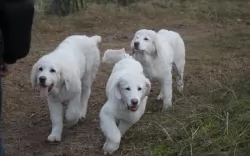 The Polish Tatra Sheepdog is an energetic dog and this means he will require a large sized garden to run around in. As a large, active dog he isn’t recommended for city living but would suit a large property where he can be well exercised. Because of its size and energy levels, regular walks will be recommended. Provide the dog with stimulating games that will be mentally and physically beneficial.
The Polish Tatra Sheepdog is an energetic dog and this means he will require a large sized garden to run around in. As a large, active dog he isn’t recommended for city living but would suit a large property where he can be well exercised. Because of its size and energy levels, regular walks will be recommended. Provide the dog with stimulating games that will be mentally and physically beneficial.
This large dog sheds, and seasonally too, so he will need to be brushed at least twice a week to prevent loose hair.
Check inside your dog’s ears for infection.
Trim your dog’s nails.
Check your dog for fleas and ticks and check him over for any unusual lumps.
Every pet lover wants their dog to live a long, healthy, active life. That is why it is so important to choose the best dog food.
If you buy commercially manufactured dog food, make sure its the high quality ones to ensure its properly formulated to provide your pet with all the vitamins and minerals he needs.
Home-made food is also an excellent choice for your pet. Boiled chicken, brown rice or pasta and spinach, sweet potatoes and carrots can be very healthy, and you can chop this up and add it into the dry kibble a couple of times a week. This is a super tasty treat. Some raw meat added in occasionally will do him the world of good.
Never leave your pet without a constant source of fresh, cool water.